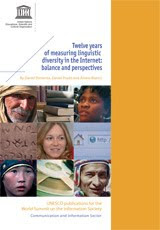
Written by Daniel Pimienta, Daniel Prado and Alvaro Blanco, this publication is an update to the previous UNESCO study on this subject that was issued for the World Summit on the Information Society in 2005.
FUNREDES and Union Latine have designed an original research method to measure linguistic diversity in cyberspace. The aim was to use search engines and a sample of word-concepts to measure the proportionate presence of these concepts in their various linguistic equivalences.
Research, undertaken from 1996 to 2008, enabled interesting indicators to be built to measure linguistic diversity. The paper describes the research method and its results, advantages and limitations. It also provides an overview of existing alternative methods and results, for comparison.
The paper concludes with the examination of different perspectives in the field which have in the past been considered to have been characterized by a lack of scientific rigor. This has led to some misinformation about the dominant presence of English on the Web. It is a topic that is only now slowly attracting due attention from international organizations and the academic world.
No comments:
Post a Comment